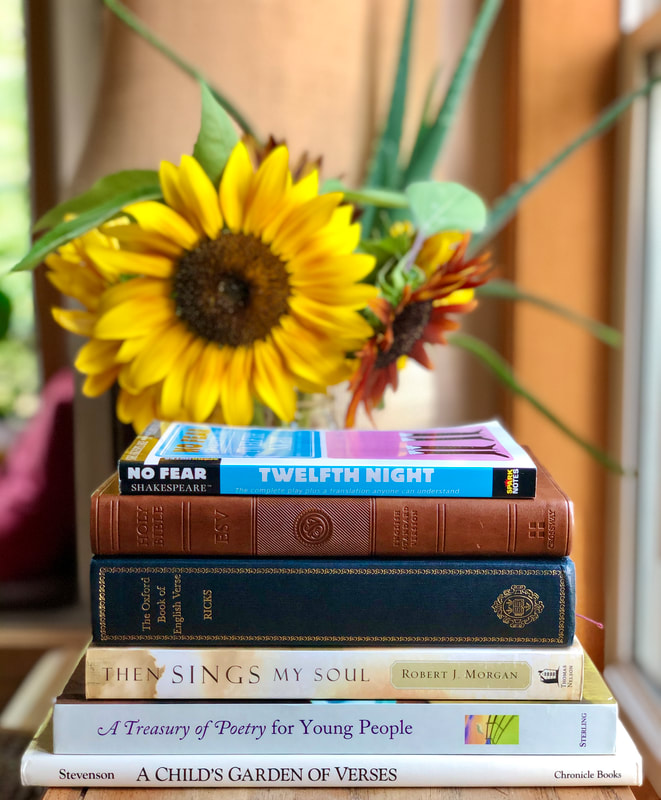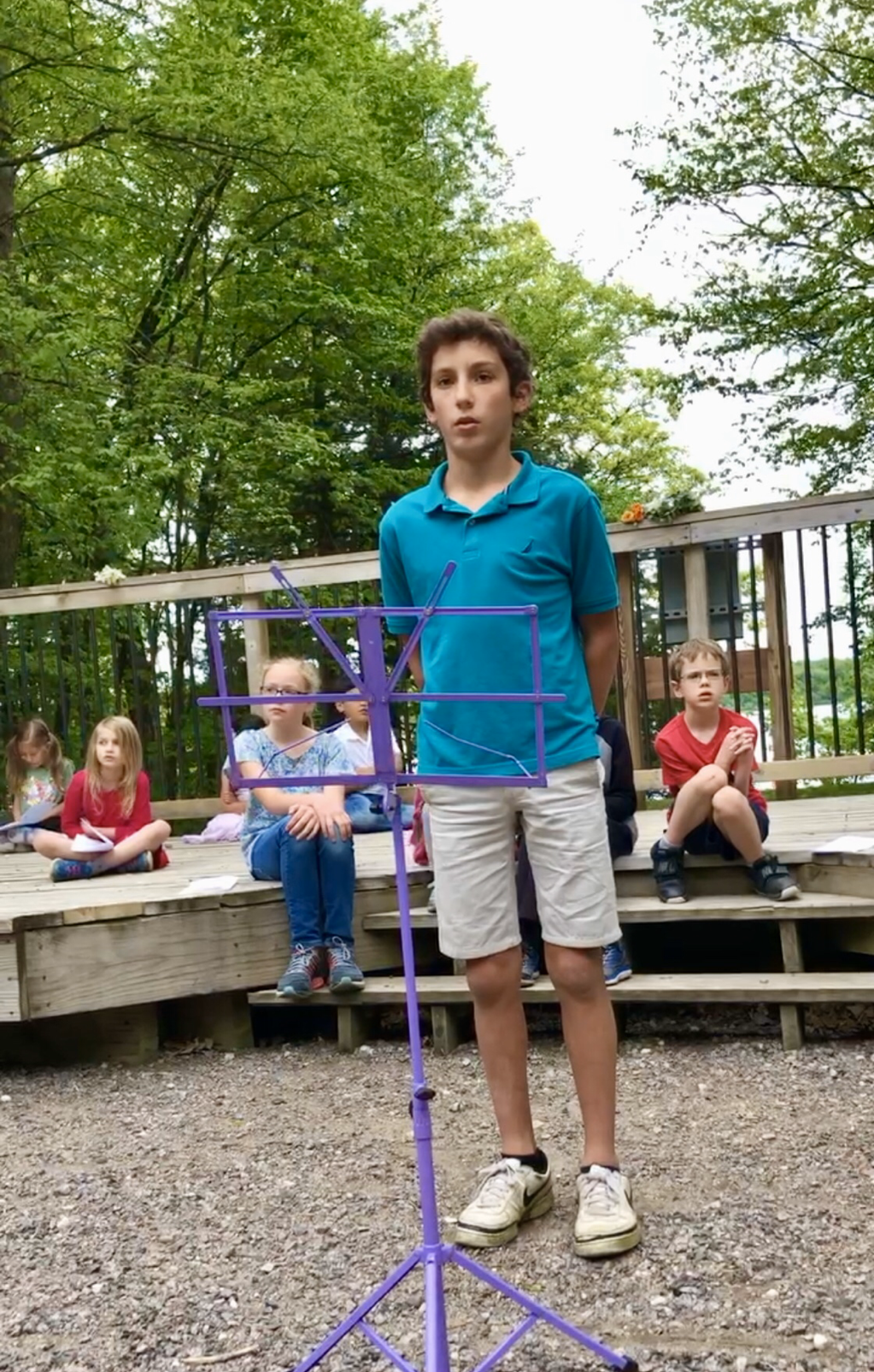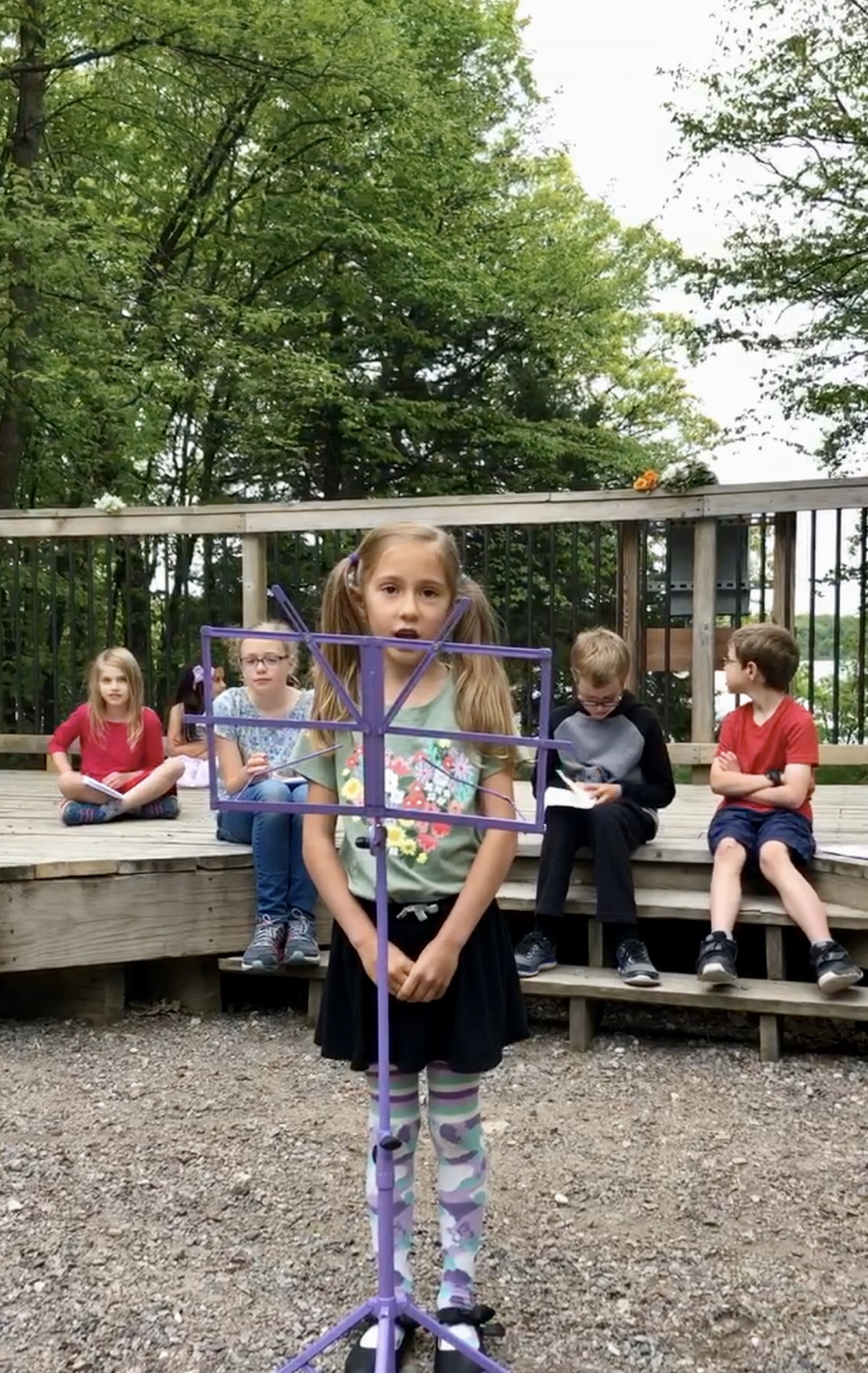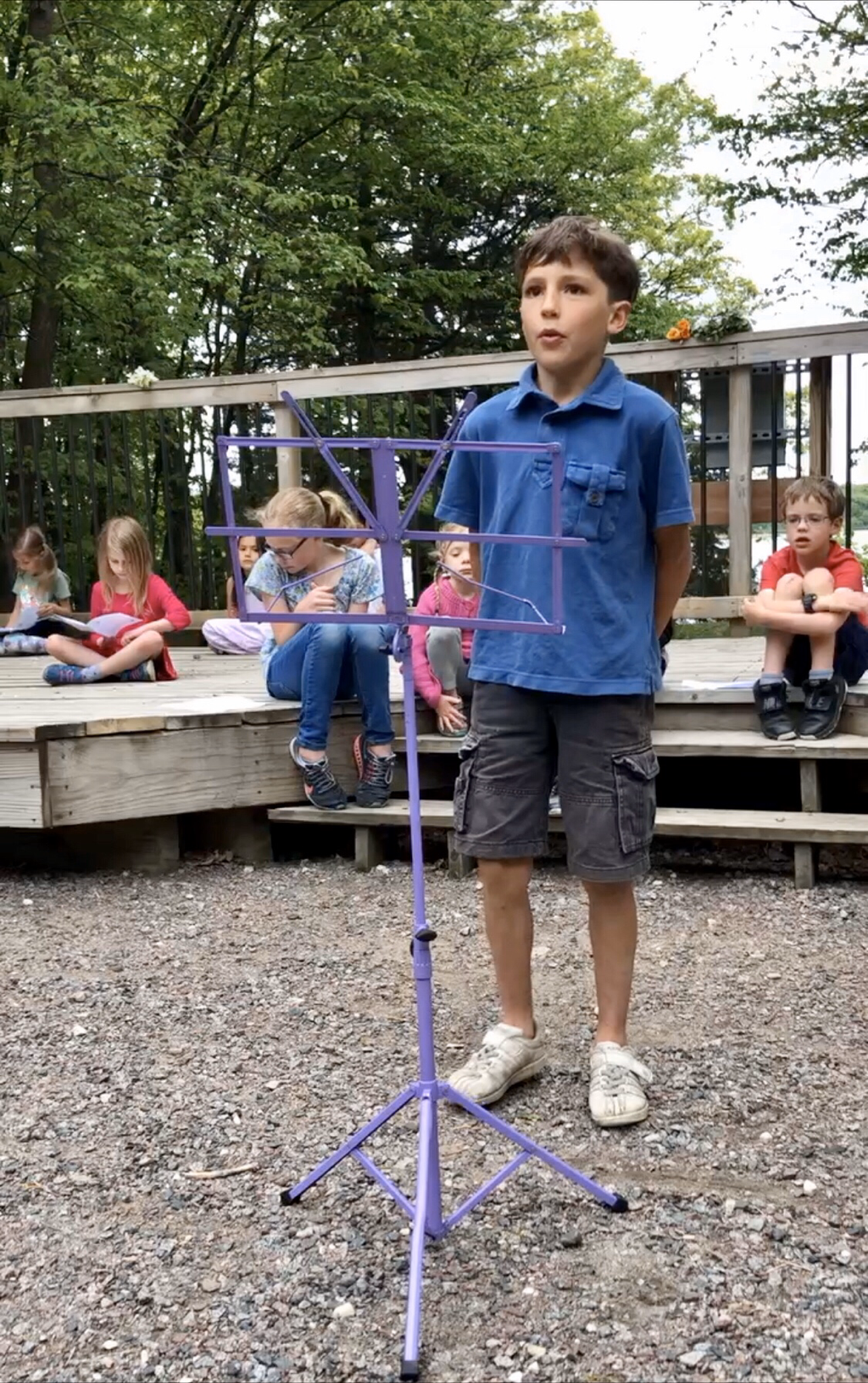Recitation has been and always will be one of my favorite subjects, not only to teach, but to practice myself. I was really excited to find out that recitation was an important lesson in Miss Mason's schedule; important enough that it was given a daily time slot. 10 minutes every day. Not too long, remember Miss Mason was a big fan of short lessons, but important enough to be included daily. The reason it is one of my favorite lessons is probably because I grew up with it myself as a child, recited lots of poetry beginning at the age of 3, and with my Ukrainian background, I was raised by parents who continually discussed recitation, reminisced on poetry from their childhood, and taught and taught us the importance of speaking beautifully. I was public schooled my entire life, so this was not a homeschool thing that my parents did, but rather they saw value in storing beautiful verses in a child's memory and having proper speech. I rediscovered the art after reading Charlotte Mason's and Arthur Burrell's writings. I began to see and understand its importance and beauty in any person's life, and since then, I've been researching how to conduct lessons, how and which selections to choose, and understanding the role it plays in a child's education. When Charlotte Mason begins her paragraph about recitation on p. 222 of Home Education, she mentions Arthur Burrell as the go to for learning about the subject. She says, "On this subject I cannot do better than refer the reader to Mr Arthur Burrell's Recitation. This book purports to be a handbook for teachers in elementary schools. I wish that it may be very largely used by such teachers, and may also become a family hand-book; though many of the lessons will not be called for in educated homes. There is hardly any 'subject' so educative and so elevating as that which Mr Burrell has happily described as 'The Children's Art.' All children have it in them to recite; it is an imprisoned gift waiting to be delivered, like Ariel from the pine." But we will come back to Mr. Burrell in a moment. Charlotte Mason says, "Recitation and committing to memory are not necessarily the same thing, and it is well to store a child's memory with a good deal of poetry, learnt without labour." p. 224. And, "The child must not try to recollect or to say the verse over to himself, but, as far as may be, present an open mind to receive an impression of interest." To read more on my thoughts about recitation vs. memorization, go back to my first post HERE. Miss Mason concludes her section on recitation by saying, "I hope that my readers will train their children in the art of recitation; in the coming days, more even than in our own will it behove every educated man and woman to be able to speak effectively in public; and, in learning to recite you learn to speak." p. 224. And that is one of the biggest takeaways that compelled me to make sure we did not skip out on recitation in our homeschool. Learning to speak effectively, especially in public, is a skill that seems to lack more and more in this technologically advanced world. We don't have to speak as much in public. We can type, text, watch, or hear. But to give the gift of speaking beautiful thoughts to our children is simply invaluable. Let's take a closer look at what Arthur Burrell, the author of Clear Speaking and Good Reading and of the Parent's Review article titled Recitation: The Children's Art, had to say on the topic. Burrell opens up his book by saying, "Now, reading aloud always was, is, and always should be, very important. The great works of the world were written to be read or given aloud." p.3 of Clear Speaking and Good Reading. The Iliad and the Odyssey, The Law, Psalms, Gospels, and Shakespeare are a few he names. He continues by saying, "It [the art of recitation] requires the preservation and careful training of that elegance of voice which Nature bestows on almost all of us." p.4. It also requires a wide acquaintance with the masterpieces of literature. Burrell identifies recitation as the proper repetition of prose or verse without look and without conscious effort of memory. And that his wish is that recitation would rather be called retelling, story telling, or recounting, because recitation falsely places the idea that it must be extravagant and artificially exaggerated, rather it should be noble, sweet, and preservation of the natural voice. To help develop this story telling voice, introduction of fairy tales early on in a child's life lay the foundation of a love for literature. The children are encouraged to hear their own voices as story tellers as they narrate back, and are introduced to the world of fancy. Laying down the Foundation Now, getting into technicalities and "lists", let's talk about Arthur Burrell's necessities for speaking. 5 Necessities for Speaking
Ventilation - make sure children spend plenty of time in the outside air. If you're already following the CM philosophy, you're probably already spending 4-6 hours every day outside. It's also important to keep your home and schoolroom well ventilated by daily opening windows, especially not forgetting during the winter season. Easy Dress - make sure children not only wear loose and elastic clothing vs belts and collars, but clothes should be free, allowing no restrictions in movement, especially round the chest. Cold Water - this is an interesting one! Mr. Burrell recommends that children take a daily cold bath, or at least a cold sponge bath, which stimulates the immune system and promotes good blood circulation, which spreads out nutrients and oxygen more efficiently throughout the body and makes the body more alert. Good circulations brings more oxygen to the lungs, which understandably allows for better speech. Personal Cleanliness - make sure children have good oral care habits, as in brushing their teeth regularly, occasional gargling, and cleaning of nasal passageways. Daily Gymnastics or Games - make sure children are doing exercises that will expand their chest and allow for deep breathing. It is not a bad idea to conduct recitation lessons after physical activity, Swedish drill, running, or outside games. You can read more about each necessity in his book pages 9-12. Another layer to their foundation of having good speech is to make sure that students are given opportunities of hearing good English spoken, whether it be from you reading aloud, audiobooks, hearing speech from the pulpit at church, or theater. Now that we've laid the foundation for recitation and good speaking, let's look at how to choose passages and literature selections. Choosing Recitation Pieces Charlotte Mason suggests that each term children should recite a Psalm, an Old Testament, a New Testament passage, a Hymn (or two), and a poem and/or lines from a Shakespeare play. It will be of great benefit if the chosen selections are from what the child is currently studying that term. So choose a poem from your term’s poet, a hymn that you are singing that month, a Shakespeare play that you’re reading through, and so on. Let's look at each form's suggestions. Form 1 a poem 2 hymns a Psalm 6 verses of an Old Testament passage 6 verses of a New Testament passage Form 2 1 or 2 poems and/or Shakespeare selection for a total of 40 lines 2 hymns a Psalm 12 verses of an Old Testament passage 12 verses of a New Testament passage Form 3/4 1 or 2 poems and/or Shakespeare selection for a total of 50 lines 2 hymns a Psalm 20 verses of an Old Testament passage 20 verses of a New Testament passage Important: Each selected piece must be understood by the child. No child should be set to learn by heart what he does not understand. Let's take a moment to bring attention to Bible Recitations and read what Charlotte Mason had to say on it herself: The learning by heart of Bible passages should begin while the children are quite young, six or seven. It is a delightful thing to have the memory stored with beautiful, comforting, and inspiring passages, and we cannot tell when and how this manner of seed may spring up, grow, and bear fruit; but the learning of the parable of the Prodigal son, for example, should not be laid on the children as a burden. The whole parable should be read to them in a way to bring out its beauty and tenderness; and then, day by day, the teacher should recite a short passage, perhaps two or three verses, saying it over some three or four times until the children think they know it. Then, but not before, let them recite the passage. Next day the children will recite what they have already learned, and so on, until they are able to say the whole parable." p. 253 Home Education So we can see that it isn't simply memorizing verses, but instead memorizing passages, stories, parables, and retelling them as best they can using the Bible language that they have read or heard over and over the course of 12 weeks. So now that we've laid down the foundation and selected the passages, we can look at how to conduct recitation lessons. Conducting Recitation Lessons We like to put all of our selections in a binder and dedicate 10 minutes each day to have the students read aloud one passage/day. It might be helpful to create a schedule where on Mondays you recite a Psalm, on Tuesdays a poem, and so on. Begin by reading the passage to your child if they are not reading yet, or having your child read the passage silently to themselves, and then aloud to you. Allow the child to bring out their own feelings and emotions through the passage. The child should stand while reciting, with a good posture, and take importance to have proper pronunciations. Encourage them to speak slowly and eloquently. Mason writes, "The child should speak beautiful thoughts so beautifully, with such delicate rendering of each nuance of meaning, that he becomes to the listener the interpreter of the author's thought." p. 223. On page 78 of Mr. Burrell's book we find another list, this one being: Reading Rules
I'd like to touch on a few of these. The first rule, Go Slowly, couldn't be more important. I have a son that wants to do everything so quickly: eat his food fast which leaves a messy trail behind, get dressed quickly which usually results in clothes worn backwards and/or inside out, etc. So with recitation he naturally wants to speed through, so we work on this daily. Daily reminders to slow down, to speak beautifully, to give each letter it's proper sound. This is the groundwork, so until your student learns to slow down, do not move forward. The third rule has been the biggest game changer for us. Make sure that your student is pronouncing the last letter sound of each word. Practice speaking words by focusing on that last sound. Say them slowly and make sure to articulate each and every letter. Especially the t's, d's, and g's. Think about these words as you read them aloud, and "bite" that last letter:
Number five seems pretty obvious, but I can't tell you how many times I've had to remind students to place their book or paper below their chin so their voice could be projected. After these 8 rules, Mr. Burrell leaves us with a GOLDEN RULE: PAY NO ATTENTION TO COMMAS, SEMICOLONS, OR FULLSTOPS, BUT PAUSE WHENEVER YOU SEE A PICTURE. And yes, in his book, he capitalized the entire golden rule. Take some time to really think about what that means. This is really important for children with dyslexia or other special learning needs. An image must be formed in a child's mind in order for them to remember their phrases, passages, and stories. Encourage your child, as they are working through their recitations, to make a mental image of what they are reading. And those mental images should guide them where to pause when delivering their recitation to an audience. Another tip here for possibly shy or introverted children, have them recite to their favorite toys, dolls, or stuffed animals. Helpful Tips for Recitation Practice Now you've reached the recitation practice and may be wondering how and when should you correct them or help them become better at the art. Here are some tips to help you along:
Taking it Further If you have a good handle on recitation, there are a few ways to take it further. As soon as children learn their pieces, they can enter them into a common-place book, or better yet dedicate a special recitation journal which will be a keepsake of beautiful memorized work. This can also double up as copy work. Bonus! Hosting a recitation night with family, friends, or a co-op is another special way to share those pieces your children have work so hard on. Make it a special night with dinner and desert, or have them dress up in their best outfit. Invite other families to have their children participate as well. Arthur Burrell writes much more on how to teach children to recite beautifully and what you should encourage or discourage in the art. If you ever have the chance to read his writings, it will greatly enhance your home recitation lessons. But for now start here. Take one step at a time. And give your children grace as you discover this art together! For good authors cannot die; the human voice is forever conferring immortality upon them." - Arthur Burrell Additional Resources:
A Delectable Education Podcast on Recitation An ADE Immersion Lesson my recording with Charlotte Mason Says Podcast on Recitation Recitation Program Details by ADE Bible Passages for Recitations by ADE Ruminating on Recitation by Maria Bell That They Might Delight in Knowing by Maria Bell
1 Comment
|



